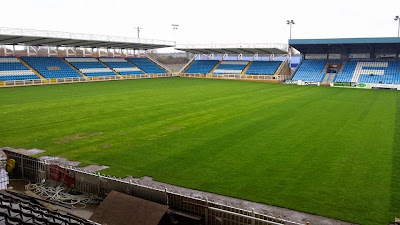The
early 1940’s were dominated by World War Two, but Featherstone Rovers, unlike
some other clubs, found a way to keep going and put a team out on the park.
Inevitably though, the teams were subject to a lot of changes and many players
were used in the course of a year. It was actually during the war that future
player coach Eric Batten first appeared for Featherstone Rovers, as a guest
player on loan from Bradford Northern. By the end of the war the league, which
had been 28 clubs in 1939, was down to just 17 clubs.
For Featherstone’s wingmen tries were no easier to
come by in the 1940s than they had been in the 1930s. For example, in 2013
Will Sharp was our top scoring winger with 19. Back in 1944 Albert Place
finished top of our try scoring charts with just four tries. The sport of rugby
league was obviously very different back then. Still, local lads such as Tommy
Crabtree, Jack Lane, Larry Hossack and Jack Ogden did their best in a
struggling team. Well-known full-back Jack Blackburn also played quite a lot of
rugby on the wing when he came out of the Army after the war.
Pick of the bunch at that time though was Albany
Longley. He made his debut in 1938, and his ten tries that year were just one
behind top scorer Ralph Asquith, the local butcher. Longley, tall and handsome,
cut a dashing figure down the wing. Contemporary accounts have him as a raw
talent, as he preferred to use his speed and nous rather than being coached
into how to improve his play. He continued scoring at a relatively prolific
pace, 15 tries in his second year, which included a try in our first ever
Yorkshire Cup final win. He followed this with ten tries in his third year,
behind only the great Walt Tennant. Albany was top try scorer in his own right
in 1942. After that, like so many other players of the era, Longley had to
spend time in Army. Once peace was restored, Albany continued his fine form,
winning his county cap for Yorkshire in 1946. He again finished top of Rovers’
try charts, this time with just six tries, which gives you an idea of how grim
that year must have been. In total, Albany Longley played 157 games for
Featherstone and scored a healthy 76 tries. Soon after retiring, his cousin
Norman Longley broke into the first team and made a name for himself as a
steady back-row forward. After finishing playing, Albany ran a scrap metal yard
in Post Office Road.
At the end of the 1940’s Featherstone made one of
their most significant signings ever. They recruited, on a permanent basis, the
Bradford veteran Eric Batten who had guested for Rovers back in 1940. He would
become the club’s first ever player coach and his presence would transform the
club over the next decade.

No comments:
Post a Comment